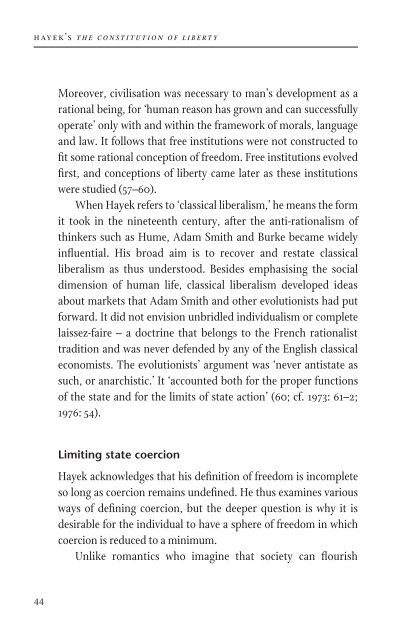Hayek's The Constitution of Liberty - Institute of Economic Affairs
Hayek's The Constitution of Liberty - Institute of Economic Affairs
Hayek's The Constitution of Liberty - Institute of Economic Affairs
You also want an ePaper? Increase the reach of your titles
YUMPU automatically turns print PDFs into web optimized ePapers that Google loves.
h ay e k ’ s t h e c o n s t i t u t i o n o f l i b e r t y<br />
i n d i v i d ua l f r e e d o m , c o e r c i o n a n d p r o g r e s s<br />
Moreover, civilisation was necessary to man’s development as a<br />
rational being, for ‘human reason has grown and can successfully<br />
operate’ only with and within the framework <strong>of</strong> morals, language<br />
and law. It follows that free institutions were not constructed to<br />
fit some rational conception <strong>of</strong> freedom. Free institutions evolved<br />
first, and conceptions <strong>of</strong> liberty came later as these institutions<br />
were studied (57–60).<br />
When Hayek refers to ‘classical liberalism,’ he means the form<br />
it took in the nineteenth century, after the anti-rationalism <strong>of</strong><br />
thinkers such as Hume, Adam Smith and Burke became widely<br />
influential. His broad aim is to recover and restate classical<br />
liberalism as thus understood. Besides emphasising the social<br />
dimension <strong>of</strong> human life, classical liberalism developed ideas<br />
about markets that Adam Smith and other evolutionists had put<br />
forward. It did not envision unbridled individualism or complete<br />
laissez-faire – a doctrine that belongs to the French rationalist<br />
tradition and was never defended by any <strong>of</strong> the English classical<br />
economists. <strong>The</strong> evolutionists’ argument was ‘never antistate as<br />
such, or anarchistic.’ It ‘accounted both for the proper functions<br />
<strong>of</strong> the state and for the limits <strong>of</strong> state action’ (60; cf. 1973: 61–2;<br />
1976: 54).<br />
Limiting state coercion<br />
Hayek acknowledges that his definition <strong>of</strong> freedom is incomplete<br />
so long as coercion remains undefined. He thus examines various<br />
ways <strong>of</strong> defining coercion, but the deeper question is why it is<br />
desirable for the individual to have a sphere <strong>of</strong> freedom in which<br />
coercion is reduced to a minimum.<br />
Unlike romantics who imagine that society can flourish<br />
without coercive government, Hayek insists that state coercion<br />
is required to prevent private persons from coercing each other<br />
(21). This does not mean that all private coercion can be eliminated.<br />
Hayek grants, for example, that coercion <strong>of</strong> a subtle kind –<br />
psychological pressures to give in to another’s moods or demands<br />
– <strong>of</strong>ten occurs in private relationships that individuals enter into<br />
voluntarily, but for the state to regulate or restrict such choices<br />
would involve even greater coercion: ‘if people are to be free to<br />
choose their associates and intimates, the coercion that arises<br />
from voluntary association cannot be the concern <strong>of</strong> government’<br />
(138).<br />
<strong>The</strong> state monopolises coercion under all forms <strong>of</strong> government;<br />
but in a free society, the exercise <strong>of</strong> government’s coercive<br />
power is constrained and made predictable by general rules that<br />
apply equally to all individuals, including those who make and<br />
enforce the laws. Conformity to law is the primary safeguard<br />
against arbitrary government – a point that Hayek will develop at<br />
length in discussing the Rule <strong>of</strong> Law. We note that while the law is<br />
constraining, it is not in itself coercive.<br />
Coercion by the state is indispensable to freedom, but Hayek<br />
wants to reduce the need for it to a minimum. This is possible only<br />
where individuals can be expected to conform voluntarily to traditional<br />
rules <strong>of</strong> conduct and, in particular, to common moral rules.<br />
Evolved moral rules, as distinct from synthetically constructed<br />
ones, should thus be regarded with reverence and held as a matter<br />
<strong>of</strong> sincere belief. Hayek follows ‘all the great apostles <strong>of</strong> freedom<br />
outside the rationalistic school’ in emphasising that ‘freedom has<br />
never worked without deeply ingrained moral beliefs’ (62).<br />
Is our conformity to moral rules truly voluntary, or is it<br />
simply produced by a different kind <strong>of</strong> coercion or compulsion<br />
44<br />
45












